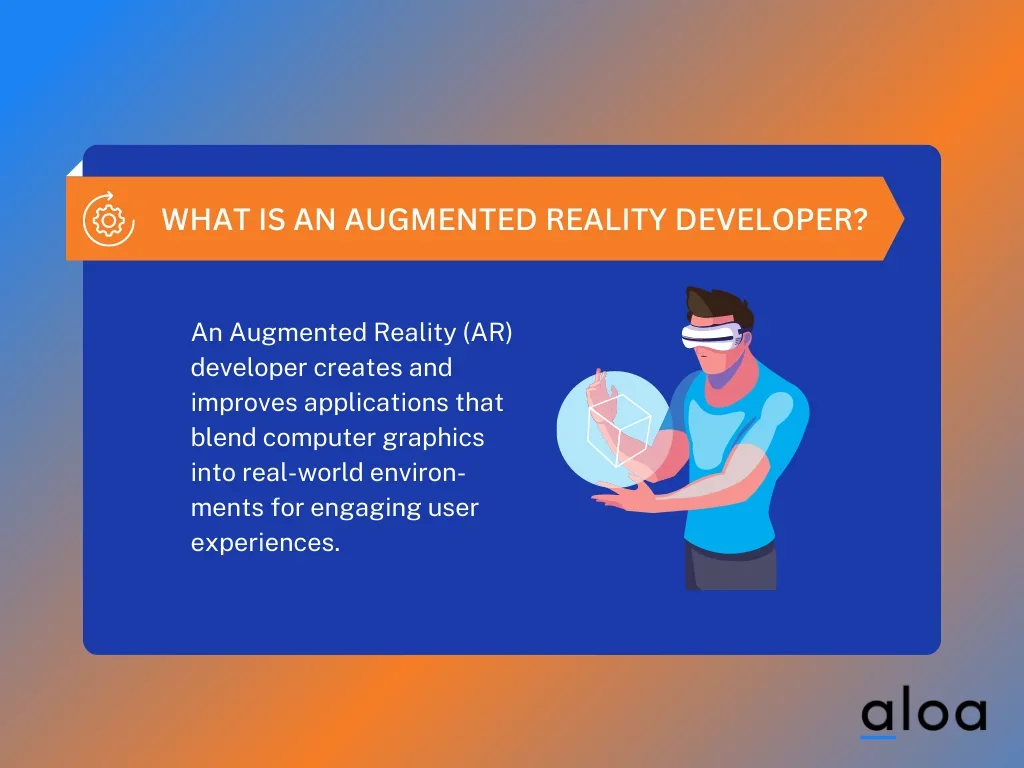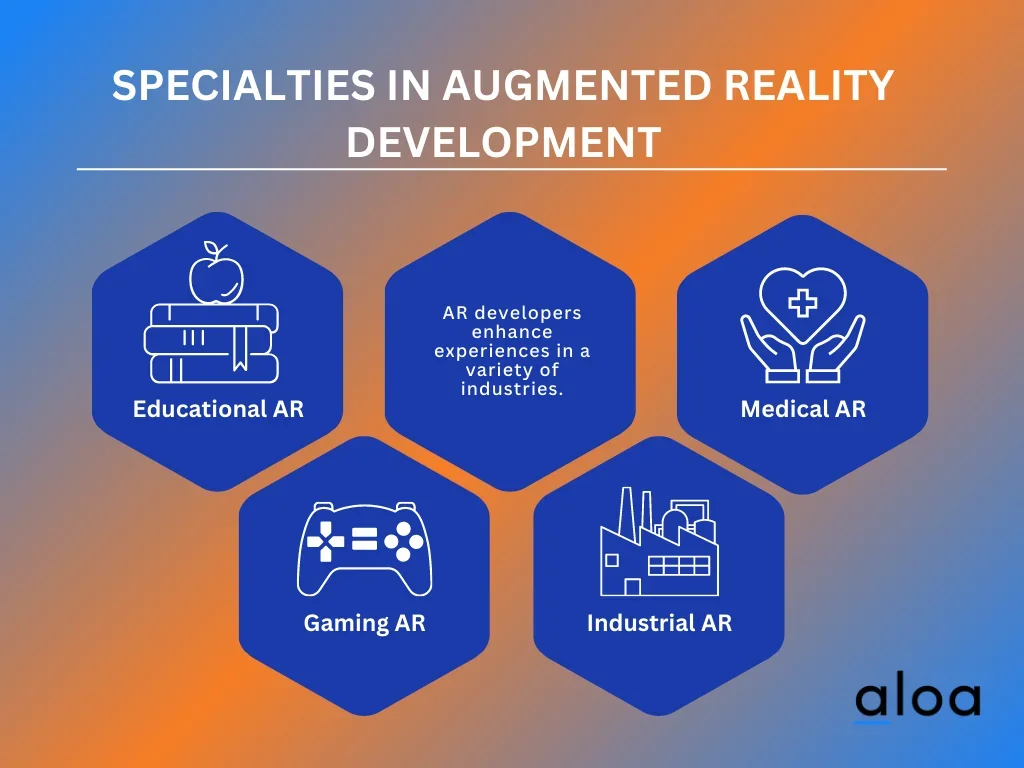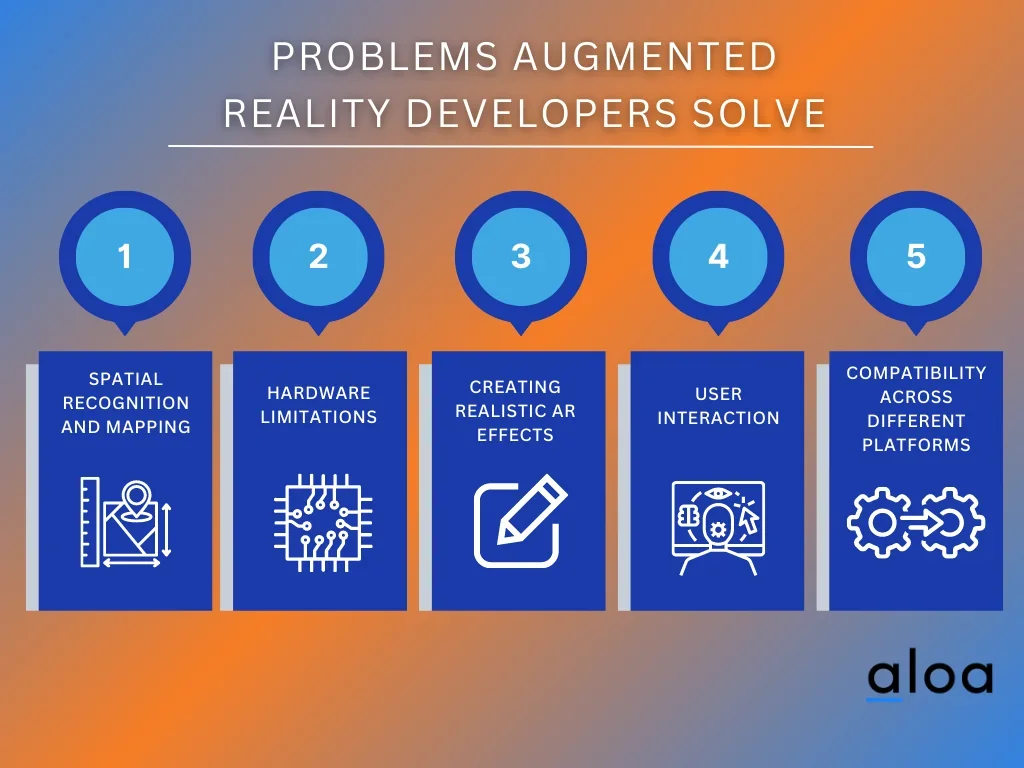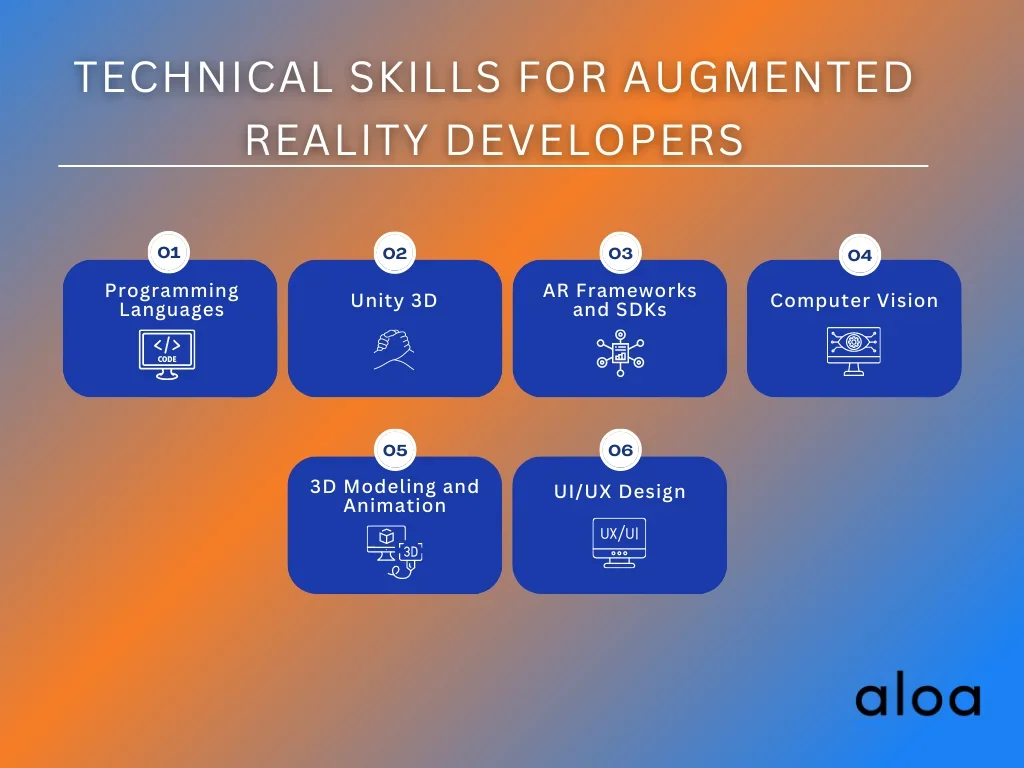Working with an augmented reality developer in 2023 moves businesses into the modern era. As we move into the 21st century, emerging tech like augmented reality (AR) is capturing the attention of businesses, software developers, and consumers. With its ability to blend the real world with interactive virtual elements, augmented reality holds transformative potential. This surge in interest is driving an escalating demand for skilled augmented reality developers, professionals who can craft high-quality AR experiences for various platforms.
As a software outsourcing expert, Aloa delivers high-quality AR solutions to businesses and startups. We believe in the power of augmented reality development to transform how people interact with the digital world. Our rigorous vetting process ensures we onboard only the most skilled AR developers with extensive experience in programming languages and AR development tools. Our clients benefit from the expertise of dedicated Account Executives, who guide the project from conception to fruition, ensuring the development of innovative AR apps that push boundaries.
This blog delves into the exciting world of augmented reality developers. We'll explore their roles, the problems they solve, their skill sets, and how much they earn globally. Additionally, we'll delve into related roles in the tech industry to offer a comprehensive understanding of the growing AR landscape. Whether you're a startup looking to incorporate AR experiences or an aspiring developer, you'll gain valuable insights into this burgeoning field.
Let's get started!
What is an Augmented Reality Developer?

An Augmented Reality (AR) developer is a specialist who creates, maintains, and improves AR applications for various platforms. They focus on crafting interactive experiences by superimposing computer-generated graphics and animations into real-world environments. Whether for mobile app or browser-based functionality, they master different SDKs to deliver compelling experiences.
Their role goes beyond gaming, and they revolutionize industries from healthcare to retail by harnessing AR's potential. They manipulate marker-based and markerless AR, demonstrating the transformative power of this emerging tech.
Specialties in Augmented Reality Development
Various specializations have emerged in the rapidly growing augmented reality (AR) field, offering multiple opportunities for AR developers. These developers create and manipulate computer-generated enhancements, seamlessly integrating them with our physical world to craft interactive and immersive experiences. Among the niches that an augmented reality developer can specialize in, four stand out:

Educational AR
AR developers work on creating reality applications that enrich the learning experience. Think virtual field trips or interactive textbook content. Tools like ARToolKit and open-source platforms are often used in this domain.
Medical AR
Augmented reality developers in the medical field contribute to cutting-edge healthcare solutions. They might use advanced APIs and computer graphics knowledge to design AR applications for surgical simulations or patient care.
Gaming AR
This is a popular area where AR developers, often with years of experience in game development, create immersive gaming experiences. Proficiency with game development platforms like Unreal and tools like Blender is critical. Developers may also employ motion tracking for enhanced interactivity.
Industrial AR
AR developers might design applications for enhancing manufacturing processes or training procedures. They often collaborate with AI specialists, which could also involve VR (Virtual Reality).
Problems Augmented Reality Developers Solve
In the ever-evolving world of technology, augmented reality developers are responsible for turning virtual dreams into reality. However, the road to creating immersive and interactive experiences has its challenges.

Spatial Recognition and Mapping
One of the critical challenges for any augmented reality developer is accurate spatial recognition. The AR platforms must correctly interpret and interact with the physical environment to make the AR effects convincing and valuable.
Hardware Limitations
With various devices like tablets, smartphones, or AR glasses, developers must consider diverse screen sizes and capabilities. There are also considerations regarding operating systems, with developers needing to navigate between Mac, Linux, or Windows.
Creating Realistic AR Effects
For augmented reality to be truly captivating, the AR effects must be lifelike. This requires developers proficient in Swift, Objective-C, or JavaScript to master complex algorithms and graphics.
User Interaction
Augmented reality developers must ensure a high degree of user interaction. This challenge can become complex when designing AR applications for gaming or social media platforms like Instagram or Facebook.
Compatibility Across Different Platforms
Developers must ensure seamless functioning as AR applications are deployed across multiple devices such as smartphones, tablets, and AR glasses. They strive to maintain cross-platform compatibility using technologies such as Vuforia SDK or Spark AR Studio.
Skills/Attributes to Look for In Augmented Reality Developer
An augmented reality developer requires a unique blend of technical skills and interpersonal attributes to excel in their role. We will explore the essential skills and attributes companies, and organizations need when hiring augmented reality developers.
Technical Skills
To be an effective augmented reality developer, proficiency in various technical skills is crucial. Here are some essential technical skills to look for:

Programming Languages
Proficiency in programming languages such as C#, C++, Java, or Python is essential for developing augmented reality applications. These languages enable developers to create the necessary algorithms, interfaces, and functionalities.
Unity 3D
Unity 3D is a popular game engine widely used in augmented reality development. Knowledge of Unity 3D allows developers to design and create interactive AR experiences, implement 3D models and animations, and handle physics simulations.
AR Frameworks and SDKs
Familiarity with augmented reality frameworks and software development kits (SDKs) is crucial. Examples include ARKit (for iOS), ARCore (for Android), and Vuforia. These frameworks provide the tools and libraries to develop AR applications for specific platforms.
Computer Vision
Understanding computer vision concepts and techniques is vital for augmented reality developers. This includes knowledge of object tracking, image recognition, depth sensing, and camera calibration to accurately overlay digital content in the real world.
3D Modeling and Animation
Proficiency in 3D modeling software like Blender or Maya allows developers to create realistic 3D objects, environments, and animations for augmented reality experiences.
User Interface (UI) and User Experience (UX) Design
Augmented reality developers should understand UI and UX design principles well to create intuitive and visually appealing AR interfaces. This involves considering factors like usability, interaction design, and visual hierarchy.
Interpersonal Skills
In addition to technical expertise, augmented reality developers should possess specific interpersonal skills contributing to their effectiveness and team collaboration. Here are some essential interpersonal skills to consider:
Communication
Clear and effective communication is essential for collaborating with team members, understanding project requirements, and presenting ideas and progress to stakeholders. Strong verbal and written communication skills facilitate seamless coordination in an augmented reality development environment.
Problem-Solving
Augmented reality developers often face complex challenges and obstacles during the development process. Strong problem-solving skills allow them to analyze issues, identify creative solutions, and implement effective problem-solving strategies.
Creativity
Augmented reality development requires thinking outside the box to create innovative and engaging experiences. The ability to generate creative ideas and find unique solutions is a valuable asset for developers in this field.
Attention to Detail
Attention to detail is crucial in augmented reality development, as even the slightest misalignment or inconsistency can disrupt the immersive experience. Meticulousness and precision ensure that AR applications meet high-quality standards.
Collaboration and Teamwork
Augmented reality development projects typically involve multidisciplinary teams. Being a team player and having the ability to collaborate effectively with designers, artists, and other developers is vital for a seamless development process.
Adaptability
The field of augmented reality is rapidly evolving, with new technologies and frameworks constantly emerging. Developers must be adaptable and open to learning new tools, techniques, and programming languages to stay updated with industry advancements.
Salaries Across the World
Augmented reality developers play a crucial role in the ever-expanding tech industry, and their skills are in high demand globally. As companies continue to adopt augmented reality technology, the salaries for these developers vary across different regions. Let's explore the salary ranges in the United States, LATAM, India, and Eastern Europe.
United States
In the United States, augmented reality developers enjoy some of the highest salaries in the field. The average annual salary for an experienced augmented reality developer in the US ranges from $90,000 to $150,000, depending on location, years of experience, and the company's size. In tech hubs like Silicon Valley and New York City, salaries can reach even higher figures, often exceeding $150,000.
LATAM
In Latin America (LATAM), augmented reality is gaining traction, and the demand for skilled developers is rising. While salaries in LATAM may be relatively lower compared to the US, they still offer attractive compensation packages. On average, augmented reality developers in LATAM earn between $30,000 and $60,000 annually. The specific salary range can vary depending on the country, with countries like Brazil and Argentina offering higher salaries than others in the region.
India
India has emerged as a significant technology and software development hub, including augmented reality. The country boasts a large pool of talented developers, making salaries more competitive. The average annual salary for augmented reality developers in India ranges from $15,000 to $40,000. However, it's worth noting that the cost of living in India is significantly lower than in other countries, making these salaries more favorable in the local context.
Eastern Europe
Eastern Europe has become an increasingly popular destination for tech companies, including those working in augmented reality. Countries like Ukraine, Poland, and Romania offer highly skilled developers at relatively lower costs than other regions. The average salary for augmented reality developers in Eastern Europe ranges from $20,000 to $50,000 annually. Salaries may vary based on the specific country, with certain locations like Warsaw and Kyiv offering higher compensation.
Factors Influencing Salary Variations
Several factors influence salary variations for augmented reality developers across different regions. These factors include:
- Cost of Living: Salaries align with the cost of living in a particular region. Higher living costs generally translate to higher salaries.
- Demand and Supply: Regions with a high demand for augmented reality developers and a limited supply of skilled professionals can offer higher salaries to attract and retain talent.
- Economic Conditions: Economic stability and growth of a region can affect salary ranges. Stronger economies often offer better compensation packages.
- Experience and Skill Level: Developers with more experience and advanced skill sets command higher salaries regardless of location.
While salaries vary across regions, it's essential to consider the overall compensation package, including benefits, work-life balance, and growth opportunities, when evaluating opportunities as an augmented reality developer.
Similar Jobs within the Industry
Augmented reality developers are key players in the emerging tech industry, but they are not alone in shaping the future of immersive experiences. Several similar roles exist within the industry, each contributing their unique skills and expertise. Here are six jobs that share similarities with the role of an augmented reality developer:
Virtual Reality (VR) Developer
VR developers create immersive experiences using virtual reality technology. While augmented reality overlays digital content onto the real world, virtual reality creates entirely digital environments. VR developers possess similar skills to augmented reality developers, including proficiency in programming languages and 3D modeling.
Data Analyst
Data analysts play a vital role in developing augmented reality applications. They gather and analyze data generated by users' interactions with AR experiences to identify patterns and insights. This information helps developers enhance the user experience, optimize performance, and make data-driven decisions.
UX/UI Designer
User experience (UX) and user interface (UI) designers collaborate closely with augmented reality developers to create intuitive and visually appealing AR applications. They focus on designing interactive interfaces, ensuring seamless user navigation, and optimizing the overall user experience within the augmented environment.
Computer Vision Engineer
Computer vision engineers develop algorithms and systems that enable computers to interpret and understand visual data from the real world. Their expertise is crucial in creating accurate object recognition, tracking, and spatial mapping functionalities within augmented reality applications.
Game Developer
Game developers often overlap with augmented reality developers, especially in AR gaming. They bring their expertise in designing and programming interactive and immersive game experiences to create captivating augmented reality games. Game developers work closely with augmented reality developers to integrate virtual game elements seamlessly into the real world.
Product Manager
Product managers in the augmented reality industry oversee the development and launch of AR products. They collaborate with various stakeholders, including augmented reality developers, designers, and marketing teams, to define product requirements, prioritize features, and ensure successful product releases.
Key Takeaway
Startups and businesses can greatly benefit from hiring a specialized augmented reality developer for their expertise in creating interactive and immersive experiences that bridge the gap between the digital and physical realms. By leveraging augmented reality technology, businesses can enhance their products, services, and overall customer experience, increasing engagement and revenue.
The need for augmented reality developers in startups and businesses is evident. These professionals possess the skills to transform ideas into reality by developing captivating augmented reality applications. Whether designing virtual showrooms, creating compelling marketing campaigns, or developing training simulations, augmented reality developers unlock new possibilities for businesses across various industries.
To explore the potential of augmented reality development and leverage the expertise of skilled developers, reach out to [email protected]. Contact us at Aloa to discover how augmented reality can drive business growth and success.

.webp)